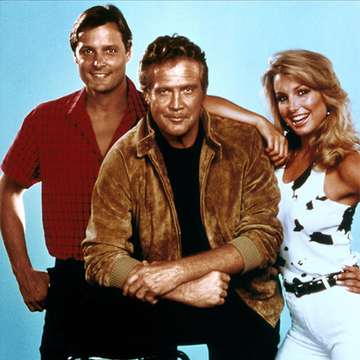When Hari Kondabolu, a comedian and filmmaker, encountered The Simpsons character Apu for the first time he was eight years old and thrilled to see someone like himself on TV. In the '90s, no one looked like him on television (with the exception, perhaps, of a cab driver here and there). A brown character on primetime TV, on a show he loved, "was the best thing in the world," Kondabolu, who's now 35, tells Esquire.com.
But as he grew up, Kondabolu began to realize there was something wrong with Apu Nahasapeemapetilon, the lovable Kwik-E-Mart clerk, and devoted father of eight. There was something wrong with, "Thank you, come again," and the way Apu said it.
"I realized it was being used as a weapon, it was like, 'Oh no, the only thing we've got is bad and racist?' That's when it gets tricky," Kondabolu says.
For years, he's tried to come to terms with his own fandom of The Simpsons and the deeply stereotypical character Apu, who, for many years was the most popular South Asian character on TV.
On Sunday, truTV aired his documentary, The Problem With Apu, which is available on truTV.com, the truTV app, Video on Demand, iTunes, Roku or Amazon fire TV. In the comedic documentary, Kondabolu explores how the character—who his voiced by Hank Azaria—was created, how it helped shape America's view of south Asian immigrants, and why, after all this time, the character has failed to evolve. Esquire spoke with Kondabolu about South Asian representation in entertainment, how Simpsons fans can address this issue, and how the show can ultimately solve the Apu problem.
Simpsons fans are the type of people who are open to thinking critically about Apu.
We had a panel of Simpsons fans—the type of Simpsons fans who go to trivia every week—and when they were left in the room with each other they were quoting the show within minutes like they had their own language. I thought that would be a real challenge. And it was actually one of the most open, thoughtful conversations, because when you think about it that makes complete sense.
If you're a hardcore Simpsons fan who really understands the show and loves the show you know they go after pop culture and they're very critical. Why would you as a Simpsons fan be against critical thinking?
Certain episodes or eras of the Simpsons depict Apu better, but he's still stereotypical at his core.
I do think if you were to look at it early in the show to where we are now, he's a much better built character, whether it's him being in the Be Sharps or in the Pin Pals. The thing is that it's built on a faulty foundation, it's the best you can do with a caricature. They have smart jokes about immigration and he's one of the smarter characters on the show and they can make political statements, and that's great, but everything comes through this lens of him being an immigrant. And that's not accurate because it's a white writer's interpretation of what they think we are. There's nothing you can do about that.
The character is funny. And it's a weird thing to me because the character is one of the better characters on the show, but I can't get over that ridiculous voice that's unrealistic and goofy and the setting he's in and the fact that there are about ten jokes that repeat themselves like gods with multiple heads and arms, curry, the Kwik-E-Mart, go to the himalayas. He has eight kids, an arranged marriage.
Fans realise the problems with Apu and still love The Simpsons.
I loved the show, I loved it so much that I put up with that part of every show where Apu was there and I had to grimace and I was taken out of the show. Those were the moments that I realised this show isn't made for me. I just have to put up with it and go back into the show. It's not every time Apu speaks necessarily, but there are so many moments where I go that is so dumb, that is so bad.
I saw an episode recently that was a "Treehouse of Horror," where Burns is hunting people and he says, "Oh I smell a mix of fear and curry." Me and my brother were watching it and go "Come on!" That's not a good joke, and you know who it's for. People like me who have always loved that show have always had that moment. You can eat around the mould but the mould is still there. Let's not forget that this is there. It's been a long time.
The election of Trump increased the urgency of this documentary.
Certainly the Trump thing made me think a little bit more about why this is important. Representation counts because there are a bunch of people who are afraid of what this country is turning into. And that fear comes from what they think the other is—who they think is taking over. When the president calls Mexican immigrants rapists and murderers that's an effective way to get people scared and vote for you. When I think about this character that depicts immigrants only in economic terms and also depicts them as one dimensional, that doesn't help when you want to see people who don't look like you as your peers.
When Trump got elected, the day after felt like 9/11, especially for someone who was a person of color. There was that fear. Is someone going to hurt us? He was elected with a hate agenda. When people committed hate crimes after 9/11, it was because they didn't see the people they were hurting as fellow Americans. You have to create some separation to do that. That happens when your two major depictions are of a cartoon character who runs a convenience store and terrorists. After Trump, it was like, are we equipped as a nation to deal with this. Are there enough people who don't view the world as some of his voters do?
Yes, other characters on The Simpsons are stereotypes—but there's a difference.
All representations aren't equal. Some are weighted more. If you're going after white men or are critical of the white working class, there are many other depictions. When you're a small immigrant community each of your images mean a lot. For example when Harold and Kumar came out, that was a big deal. That was the first time there was a leading part in a movie that wasn't Gandhi. Some people were like really he has to be a pothead? This is all we get for a while and he's a pothead? When you only get a few, each one means so much more. That's why it's different.
One of the only Simpsons creators he spoke to fundamentally didn't understand the problem.
Dana Gould was really honest, which I respect, and he didn't need to be. He's the only person on the show who agreed to do this. When he said, "Many white people in America find this funny. Period." That's true. I was surprised that he owned up to the fact.
The one part that did throw me was when he tried to get me when he said, "Well, Burns is one dimensional." But there's a fundamental difference. My first thought was Yeah, you're going after rich people with power, that's good satire. But when you're going after someone from a small immigrant group who works at a convenience store, that's not someone with power. That threw me because I thought, You're one of the greatest comedy writers ever, but there's something that we don't see eye to eye on that I feel is important.
The Simpsons can fix Apu by elevating the character.
As much as I joke, I of course don't want The Simpsons to end. I don't think it's that, and I don't think it's killing the character. If they killed the character I would be so pissed. Because it's very lazy writing for such a brilliant show. What I think they should do is give him some upward mobility. If you're saying satire is built in reality, there's a lot of South Asians who run convenience stores, that's accurate. However, they often end up owning the place, buying more of them and then employing other people. They become like little moguls. If you're saying this is the truth. Then complete it. Let him be someone who competes with Burns. It's been 30 years.
Honestly, seeing the last couple of seasons, the plots are repeated, it's been on so long, to squeeze something new out of it is so difficult. Well then mix it up. They've killed characters. Add a new element and see what happens. Let us have a voice. I saw an interview with Dana where they asked what to do with Apu, and he said move him out of the Kwik-E-Mart and give it to Cletus, because that's more contemporary and relevant. You can solve some of these issues with good writing.
There has been progress with South Asian representation in entertainment, but there's more work to be done.
Careers are not as linear as they used to be. There used to be a few shows and few networks with gatekeepers who controlled everything. That's not the way it works anymore. You have so many more ways to have a show now. People aren't going for the biggest piece of the pie, they're going for a piece of the pie. They're looking for niches and how to hit certain demographics. That opens it up to a bunch of stories that have never been told. That's fundamentally different. Because there are all of these voices that have been suppressed by this old system and how this country has treated women and people of colour and members of the LGBTQ community that means that now all the stories we have are new. It's filling in a gap on what's necessary to fill. I see a lot of progress in that.
Still, there's not enough South Asian women that we get to hear, or the LGBTQ community, or the voice of an immigrant not just in my community but across the board. I do see a huge opportunity of new stories.
What he would have said to Hank Azaria had the Apu voice actor agreed to talk.
To me having him wasn't a gotcha moment. What I really wanted at the end of the film was to have a real conversation. I wanted people to see it and say, "Oh this is two adults trying to work through something, but they're funny about it and it's kinda awkward, but they work through it and come to a compromise." Even if there wasn't a clean resolution, I wanted to show the importance of those awkward conversations, especially in this era—that's so crucial. I would have asked: How do you feel about the character now? Who did create the character? How come there's confusion over it? Do you regret doing that Tufts graduation where you do the voice? Do you not have any South Asian friends? What have you heard since? There's so many different things to ask. I want to know who he is, what's his family story, what are his struggles.













